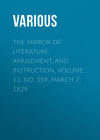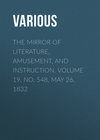Читать книгу: «The Mirror of Literature, Amusement, and Instruction. Volume 13, No. 359, March 7, 1829», страница 6
Supper was brought in. It consisted of eggs, cold veal, bacon-ham, and a Welsh rabbit. I must confess, that, perplexed as I was by all the previous events of the evening, I felt a gratification at the present moment, in the anxiety to see how the Man-Mountain would comport himself at table. I had beheld his person and his shadow with equal admiration, and I doubted not that his powers of eating were on the same great scale as his other qualifications. They were, indeed. Zounds, how he did eat! Cold veal, eggs, bacon-ham, and Welsh rabbit, disappeared "like the baseless fabric of a vision, and left not a wreck behind;" so thoroughly had nine-tenths of them taken up their abode in the bread basket (vide Jon Bee) of the Man-Mountain; the remaining tenth sufficed for the rest of the company, viz. Julia, her aunt, her aunt's husband, and myself.
Liquor was brought in, to wit, wine, brandy, whisky, and rum. I felt an intense curiosity to see on which of the four Mr. Tims would fix his choice. He fixed upon brandy, and made a capacious tumbler of hot toddy. I did the same, and asked Julia to join me in taking a single glass—I was forestalled by the Man-Mountain. I then asked the lady of the house the same thing, but was forestalled by her husband.
Meanwhile, the evening wearing on, the ladies retired, and Mr. Tims, the landlord, and myself, were left to ourselves. This was the signal for a fresh assault upon the brandy-bottle. Another tumbler was made—then another—then a fourth. At this period Julia appeared at the door, and beckoned upon the landlord, who arose from table, saying he would rejoin us immediately. Mr. Tims and I were thus left alone, and so we continued, for the landlord, strange to say, did not again appear. What became of him I know not. I supposed he had gone to bed, and left his great friend and myself to pass the time as we were best able.
We were now commencing our fifth tumbler, and I began to feel my whole spirit pervaded by the most delightful sensations. My heart beat quicker, my head sat more lightly than usual upon my shoulders; and sounds like the distant hum of bees, or the music of the spheres, heard in echo afar off, floated around me. There was no bar between me and perfect happiness, but the Man-Mountain, who sat on the great elbow-chair opposite, drinking his brandy-toddy, and occasionally humming an old song with the utmost indifference.
It was plain that he despised me. While any of the others were present he was abundantly loquacious, but now he was as dumb as a fish—tippling in silence, and answering such questions as I put to him in abrupt monosyllables. The thing was intolerable, but I saw into it: Julia had played me false; the "Mountain" was the man of her choice, and I his despised and contemptible rival.
These ideas passed rapidly through my mind, and were accompanied with myriads of others. I bethought me of every thing connected with Mr. Tims—his love for Julia—his elephantine dimensions, and his shadow, huge and imposing as the image of the moon against the orb of day, during an eclipse. Then I was transported away to the Arctic sea, where I saw him floundering many a rood, "hugest of those that swim the ocean stream." Then he was a Kraken fish, outspread like an island upon the deep: then a mighty black cloud affrighting the mariners with its presence: then a flying island, like that which greeted the bewildered eyes of Gulliver. At last he resumed his human shape, and sat before me like "Andes, giant of the Western Star," tippling the jorum, and sighing deeply.
Yes, he sighed profoundly, passionately, tenderly; and the sighs came from his breast like blasts of wind from the cavern of Eolus. By Jove, he was in love; in love with Julia! and I thought it high time to probe him to the quick.
"Sir," said I, "you must be conscious that you have no right to love Julia. You have no right to put your immense body between her and me. She is my betrothed bride, and mine she shall be for ever."
"I have weighty reasons for loving her," replied Mr. Tims.
"Were your reasons as weighty as your person, you shall not love her."
"She shall be mine," responded he, with a deeply-drawn sigh. "You cannot, at least, prevent her image from being enshrined in my heart. No, Julia! even when thou descendest to the grave, thy remembrance will cause thee to live in my imagination, and I shall thus write thine elegy:
I cannot deem thee dead—like the perfumes
Arising from Judea's vanished shrines
Thy voice still floats around me—nor can tombs
A thousand, from my memory hide the lines
Of beauty, on thine aspect which abode,
Like streaks of sunshine pictured there by God.
She shall be mine," continued he in the same strain. "Prose and verse shall woo her for my lady-love; and she shall blush and hang her head in modest joy, even as the rose when listening to the music of her beloved bulbul beneath the stars of night."
These amorous effusions, and the tone of insufferable affectation with which they were uttered, roused my corruption to its utmost pitch, and I exclaimed aloud, "Think not, thou revivification of Falstaff—thou enlarged edition of Lambert—thou folio of humanity—thou Titan—thou Briareus—thou Sphynx—thou Goliath of Gath, that I shall bend beneath thy ponderous insolence?" The Mountain was amazed at my courage; I was amazed at it myself; but what will not Jove, inspired by brandy, effect?
"No," continued I, seeing the impression my words had produced upon him, "I despise thee, and defy thee, even as Hercules did Antaeus, as Sampson did Harapha, as Orlando did Ferragus. 'Bulk without spirit vast,' I fear thee not; come on." So saying, I rushed onward to the Mountain, who arose from his seat to receive me. The following passage from the Agonistes of Milton will give some idea of our encounter:
"As with the force of winds and water pent,
When mountains tremble, these two massy pillars,
With horrible convulsion to and fro,
He tugged, he shook, till down they came, and drew
The whole roof after them, with burst of thunder,
Upon the heads of all who sat beneath."
"Psha!" said Julia, blushing modestly, "can't you let me go?" Sweet Julia, I had got her in my arms.
"But where," said I, "is Mr. Tims?"
"Mr. who?" said she.
"The Man-Mountain."
"Mr. Tims!—Man-Mountain!" resumed Julia, with unfeigned surprise. "I know of no such persons. How jocular you are to-night—not to say how ill-bred, for you have been asleep for the last five minutes!"
"Sweet, sweet Julia!"
A MODERN PYTHAGOREAN.
Blackwood's Magazine.
SONG
BY T. CAMPBELL
'Tis now the hour—'tis now the hour
To bow at Beauty's shrine;
Now whilst, our hearts confess the power
Of woman, wit, and wine;
And beaming eyes look on so bright,
Wit springs—wine sparkles in their light.
In such an hour—in such an hour,
In such an hour as this,
While Pleasure's fount throws up a shower
Of social sprinkling bliss,
Why does my bosom heave the sigh
That mars delight?—She is not by!
There was an hour—there was an hour
When I indulged the spell
That Love wound round me with a power
Words vainly try to tell—
Though Love has fill'd my checker'd doom
With fruits and thorns, and light and gloom—
Yet there's an hour—there's still an hour
Whose coming sunshine may
Clear from the clouds that hang and lower
My fortune's future day;
That hour of hours beloved will be,
That hour that gives thee back to me!
New Monthly Magazine.
THE GATHERER
"A snapper-up of unconsidered tifles."
SHAKSPEARE.
What will our civic friends say to this, about the date of 1686?—"Among other policies of assurance which appear at the Exchange, there is one of no ordinary nature; which is, that Esquire Neale, who hath for some time been a suitor to the rich Welsh widow Floyd, offers as many guineas as people will take to receive thirty for each one in case he marry the said widow. He hath already laid out as much as will bring him in 10 or 12,000 guineas; he intends to make it 30,000, and then to present it to the lady in case she marry him; and any one that will accept of guineas on that condition may find as many as he pleases at Garraway's coffee-house."—Ellis Correspondence.
PAT O'KELLY, THE IRISH POET
Three poets, of three different nations born,
With works immortal do this age adorn;
Byron, of England—Scott, of Scotia's blood—And,
Erin's pride, O'Kelly, great and good.
'Twould take a Byron and a Scott, I tell ye,
Roll'd up in one, to make a Pat O'Kelly.
Legends of the Lakes.
IRISH NAMES, MADE ENGLISH
(For the Mirror.)
Macnamara, son of a sea-hound.
Macmahon, son of a bear.
Brien, the force of water.
Kennedy, wearing a helmet.
Horan, the gold of poetry.
Sullivan, having but one eye.
Gallagher, the helper of Englishmen.
Riordan, a royal salmon.
Lysaght, a hired soldier.
Finnoala, white-shouldered.
Una, matchless.
Farrell, a fair man.
Mohairey, an early riser.
Naghten, a strong person.
Trayner, a strong man.
Keeffe, mild.
Keating, a shower of fire.
Kinahan, a moss trooper.
Kearney, a soldier.
Leahy, a champion.
Macaveely, son of the hero.
Ardil, of high descent.
Dermid, a god in arms.
Toraylagh, like a tower.
Cairbre, a royal person.
Flinn, red haired.
Dwyer, a dark man.
Docharty, dangerous.
Mullane, broad head.
Cullane, broad poll.
Flaherty, a powerful chief.
Lalor, or Lawler, one who speaks by halves.
Tierney, a lord.
Bulger, a Dutchman.
Dougal, a Dane.
Mac Intosh, son of the chief.
Mac Tagart, son of the priest.
Mac'Nab, son of the abbot.
Mac Clery, son of a clerk.
Mac Lure, son of a tailor.
Macgill, son of a squire.
Macbrehane, son of a judge.
Mac Tavish, son of a savage.
Goff, or Gough, smith.
Galt, a Protestant.
Gillespie, the bishop's squire.
The whole of the above are literal translations without having recourse to fancy, or torturing the originals; thus, Macnamara, called in Irish Mac Conmara, from mac, a son, con, the genitive case of cu, a hound, and mara, the genitive case of muir, the sea; and so of the rest. It is proper, however, to observe, that although the name of Keating sounds exactly in Irish a "shower of fire" yet as the Keatings came at first from England, this cannot be the real origin of that name. All the rest are literally correct.
H.S.
ONIONS
Lord Bacon tells us of a man who fasted five days, without meat, bread, or drink, by smelling a wisp of herbs, among which were strong onions.
Покупайте книги и получайте бонусы в Литрес, Читай-городе и Буквоеде.
Участвовать в бонусной программе




















